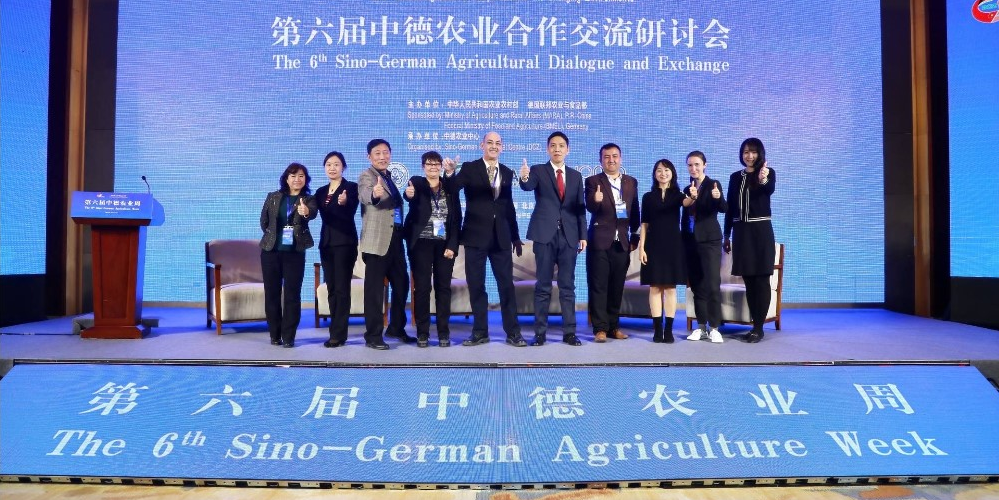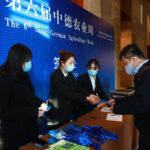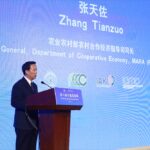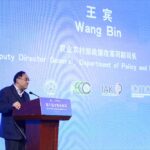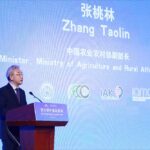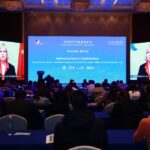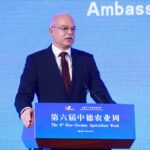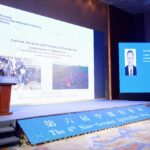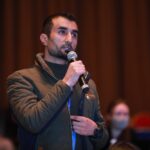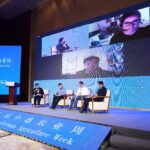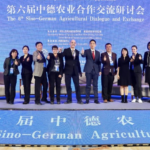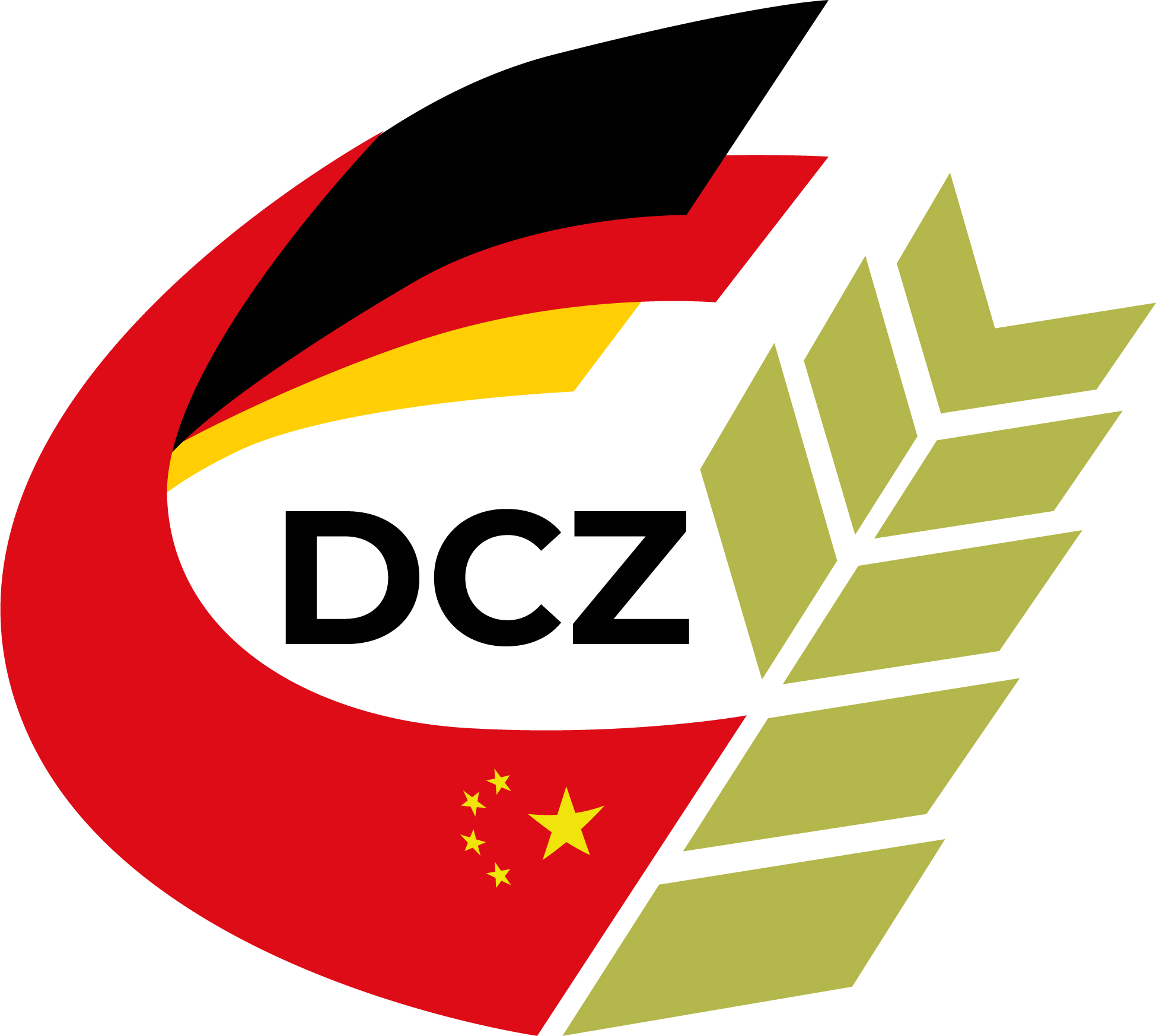The 6th Sino-German Agricultural Week (DCAW) was successfully held from 30 November to 3 December 2020 at Yanqi Lake, Huairou, Beijing, as well as an online event. As an important bilateral exchange and dialogue platform in agriculture, the event was jointly sponsored by the Chinese Ministry of Agriculture and Rural Affairs (MARA) and the German Federal Ministry of Food and Agriculture (BMEL) and organized by the Sino-German Agricultural Centre (DCZ).
Due to its hybrid character as an online and an on-site event, this year’s conference could not only host many high-ranking speakers and stakeholders at the venue, but also received recorded video speeches and real-time online contributions from Germany and even California. With daily over 10.000 hits the viewers of the online live stream clearly outnumbered the approx. 140 participants on site. Several Chinese media reported about the event and day 3 of the DCAW, the Open Day, was also in the news on CCTV-17, the “Agriculture Channel” of the Chinese Central TV Stations.
Instead of a separate event, the Agribusiness Conference was incorporated in this year’s DCAW and therefore the DCZ compiled a program of four full days with a tight schedule of comprehensive presentations and panel discussions:
- The Agribusiness Conference on “Modern Farm Management”
- The Sino-German Agricultural Policy Dialogue on “Smart Agriculture”
- The “Open Day” as main event
- The Science and Technology Platform’s “Forum on Security and Nutrition in a Changing World”
In parallel to these events the Bilateral Cooperation Project on Animal Breeding and Husbandry held two symposiums on pig and cattle breeding on 1st and 3rd of December, respectively.
The Agribusiness Dialogue on 30 November was opened by speeches of Mr. Zhang Tianzuo, Director General of the Department of Cooperative Economy in MARA and a recorded video message by Mr. Bruno Hoffstadt, Head of the Division of International Projects and Twinning in the BMEL. In presentations by academics, practitioners and local authority representatives modern farm management by means of higher standardization, intensification of production and different operational structures (family farms, cooperatives) was outlined. Modern milk production in one of the 14 German experimental fields (DigiMilch) was presented by Dr. Isabella Lorenzini via Zoom. In a panel discussion the question of how modern farm management can contribute to the modernization of agriculture and rural revitalization was discussed.
On 1 December, the Sino-German Agricultural Policy Dialogue on Smart Agriculture was opened by a keynote speech by Mr. Wang Bin, Deputy Director General of the Department of Policy and Reform in MARA and recorded opening remarks by the Deputy Director General of International Cooperation and World Food Affairs (BMEL), Ms. Cornelia Berns (BMEL) who also is the Political Director of the DCZ. Many high-ranking speakers from research and business shared their perspectives on state-of-the-art technologies for digital agriculture. Dr. Jürgen Ritter presented the DCZ video output summarizing the virtual study tour on this topic to Germany and France and announced the launch of the DCZ website on Smart Agriculture (www.smart-agriculture.org). Prof. Wu Wenbin (CAAS) moderated the final panel discussion on mutual learning in smart agriculture with experts from China and Germany.
The main event of 6th DCAW, the “Open Day” was held on 2 December under the heading “Sino-German Agricultural Cooperation in a Changing Environment” with contributions by high-level VIPs: while Mr. Hans-Joachim Fuchtel, Parliamentary State Secretary of BMEL delivered a pre-recorded speech, Mr. Zhang Taolin, Vice Minister of MARA, and Dr. Clemens von Goetze, Ambassador of Germany in China, attended the opening session in person and delivered welcome addresses. Cooperation between China and Germany was addressed from different perspectives: Mr. Axel Wildner (Agricultural Counselor in the German Embassy) presented the current situation of Sino-German trade cooperation and Mr. Damien Plan (Agricultural Counselor from the EU Delegation in China) introduced the “Agreement on Mutual Recognition of Geographical Indications for Agricultural Products between China and the EU” which only recently has been signed by both sides. Furthermore, achievements from other bilateral Sino-German cooperation projects in the field of agriculture were presented, while, finally, the panelists discussed future cooperation in changing environments.
The “Forum on Food Security and Nutrition in a Changing World” was organized by the DCZ Science and Technology Platform in cooperation with the Chinese Academy of Agricultural Sciences (CAAS) on 3 December. This event also could welcome about 100 Chinese and international graduate and PhD students from different CAAS institutes and China Agricultural University (CAU) as well as 70 online participants. Following the opening remarks by CAAS vice president Prof. Sun Tan and Ms. Maja Clausen (BMEL, Division Research and Innovation), excellent speakers shared their views on how to achieve more sustainable food systems, such as Prof. Li Xiande (CAAS Institute for Agricultural Economics and Development), Prof. Matin Qaim (University of Göttingen), Prof. Si Wei (CAU), Dr. Felicitas Schneider (Thünen-Institute), Prof. Wu Wenbin (CAAS), Prof. Sonoko Bellingrath-Kimura (ZALF), Dr. Lena Kuhn (IAMO) and Prof. Zhu Dazhou (Institute for Food and Nutrition Development of MARA). The concluding discussion was opened by a input keynote by Prof. Hans Herren (World Food Prize Winner 1995 and CEO of Millennium Institute) with a call for transformation of our food systems and action on preserving soil as the most crucial resource for food security.
Impressions
01.Han_Xingyu-Standardization_Informatization-EN+CN
02.Hu_Xinyan-International_Standards_in_Sustainable_Agriculture-CN
02.Hu_Xinyan-International_Standards_in_Sustainable_Agriculture-EN
03.Gao_Liangliang-Land_Changes_of_Family_Farms_in_China-EN+CN
04.Zhang_Lianyu-Smart_Agriculture_Keerqin_District-EN+CN
05.Su_Qifang-Cooperative_Farms_Donglin_Village-CN
05.Su_Qifang-Cooperative_Farms_Donglin_Village-EN
06.Alejandro_Figueroa-Field_Management_Program-EN+CN
07.Vincent_Gruendler-time_and_project_management_ToT-EN+CN
08.Wu_Dongli-Financial_Constraints_of_farmer_cooperatives
09.Zhang_Jinwang-VDMA_Cooperative_Pilot_Project
10.Han_Zhuo-Standardization-EN
10.Han_Zhuo-Standardization-CN
11.Fu_Guo-Fuyuan_Agricultural_Machinery_Cooperative
12.Griepentrog-DigitalFarming-CN
12.Griepentrog-DigitalFarming-EN
14.He_Yanping-Modern_Agriculture_Huanghai_Farm-CN
15.Yu_Xiaohua The Cost of Green Agriculture in Germany-CN
15.Yu_Xiaohua The Cost of Green Agriculture in Germany-EN
02.Jürgen_Ritter-SMAG_Website_Intro-EN
03.Sun_Kuifa-Smart_Agriculture_in_Rural_Zhejiang-EN
04.Li_Daoliang-Smart_Fishery-CN
07.Sun_Chuanheng-Quality_Safety_Control_IoT-CN
08.Bu_Ruike-County_Level_Big_Data_Solutions-CN
09.Luo_Xiwen-Unmanned_Agricultural_Machinery-CN
10.Herlitzius-Transformation_of_Modern_Agriculture-EN
11.Xia_Qifeng-High-Tech_Enterprises_in_Smart_Agriculture-CN
13.Xu_Zhenyu-Practice_of_Smart_Agriculture-CN
01.Shen_Yi-China-US-Europe-Relations-CN
02.Axel_Wildner-Sino-German-Economic-Cooperation-CN
02.Axel_Wildner-Sino-German-Economic-Cooperation-EN
03.Zhang_Hongyu-Current_Agricultural_Development-CN
04.Damien_Plan-Geographical_indications_for_Agri_Products-EN+CN
05.Jürgen_Ritter-DCZ_in_2020-EN
06.Hong_Zhijie-Sino-German_Exchange_Program_for_Young_Experts-EN+CN
08.Cao_Hong-Rural_Modernization_of_Suzhou-CN
08.Cao_Hong-Rural_Modernization_of_Suzhou-EN
11.Schmitt_Ferdinand-Cooperation_Project_Animal_Breeding-EN+CN
12.Chai_Yu-Agribusiness_Dialogue_in_China-EN+CN
13.Xu_Lili-Status_Quo_Sino-German_Trade_Relations-CN
13.Xu_Lili-Status_Quo_Sino-German_Trade_Relations-EN
Maja_Clausen-Opening_Remarks_BMEL-EN
02.Matin_Qaim-Sustainable_Food_Systems-EN
03.Si_Wei-Food_Security_and_Soybean_Trade-EN
04.Felicitas_Schneider-Role_of_Food_Loss-EN
06.Sonoko_Bellingrath-Kimura-Ecosystem_Services_in_Land_Uses-EN
07.Lena_Kuhn-Trade_and_Diets-EN




